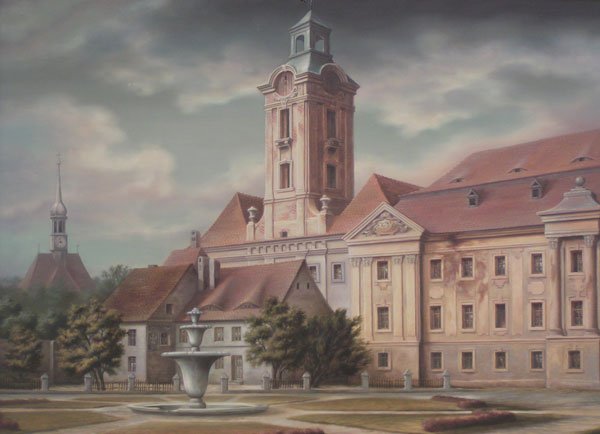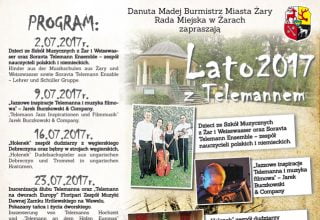The composer arrived at the castle in Żary at the age of 23, but despite being so young he had already gained rich experience and cherished recognition in the world of music. Surely Erdmann II von Promnitz during his travels around Europe often heard about the musical talent of Telemann. After his stay in France, the count became so in love with their music that when he returned to Żary at the court the French style sounds started to be heard. This is how Telemann remembers the time spent in Żary: ‘The splendor of this court put up anew on the prince level encouraged me to enthusiastic undertakings, especially in the area of instrumental music, and I especially liked overtures with their suites because His Majesty Count had come back from France shortly before my arrival and he especially took to them. There I received the works of Lully, Campre and other masters, and I almost completely gave in to their style, and so within not longer than two years I wrote two hundred overtures. When the mentioned court moved to Pszczyna, the lordly mansion of the Promnitzes in the Upper Silesia, I got to know both there and in Cracow the Polish and Hanacka music [Hanacksas – inhabitants of Moravia] in its truly barbaric beauty’.
Despite the dominant at those times music styles from Italy and France, in the output of Telemann the listener will easily find original music forms and elements of Polish folk music, rhythms of mazurkas and polonaises. Even in the very name of the pieces the composer stressed the source of inspiration: ‘Polish concerts for the string band and harpsichord (B-major, G-major, D-major), ‘Polish sonatas’ and ‘Polish suites’. When composing he took inspiration from every possible source, getting to know various styles and trends. In his childhood he learned from masters who lived then, rewriting their scores, and when he grew up he gained knowledge even in public houses. He was open-minded and he constantly searched for something new. He traveled with the Promnitz’es retinue around their friendly Silesian and German courts. The stays in public houses and inns in the neighborhood of Pszczyna and Cracow and coming across their folk music had an important influence on the further output of Telemann. ‘It is simply hard to believe how fantastic ideas have such pipers and violinists when, during the breaks in dancing, they start to improvise. An attentive man could be provided with ideas for his whole life within a week (…) In this style I later wrote concerts and trios which I decorated with the Italian design with changing adagios and allegros.’
He liked simple and clear melodies which caught the ear and showed the charm of the sound of particular instruments. Thanks to that his compositions found many lovers and that was probably the secret of his success. He was a representative of a new music style called gallant and he opposed the complicated, polyphonic music of the late baroque.
‘I personally value the music of Telemann very much for the fact that he could write about important and beautiful things very directly, without building facades and labyrinths. He spoke about everything in the way he felt and thought. His violin Fantasies are a beautiful proof of that – they take us into the stream of narration, they are vibrant with life and normality. In those pieces there is place for pensiveness, fun, love, sadness, dance, dream.’ These are words of Sławomir Tomasik – a violinist, educationist, lecturer of the second grade at the Warsaw Music Academy, the author of the notes study ’12 Fantasies for solo violin by Georg Philipp Telemann’ issued in 2007.
Telemann was glad with the stay at the Żary and Pszczyna courts of the Promnitzes. He met there the famous ‘musici theoretici’, led by Wolfgang Caspar Printz and the court musicians – not only those from Germany, but also Poles and Czechs. Fascinated by the Slavic music, he even wrote an eulogy in its honor:
‘A man praises exactly what might make him happy
and Polish song makes every dancer really snppy.
It is easy for me then to draw a certain conclusion,
Polish music, believe me, may only boast of profucion.’













